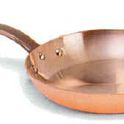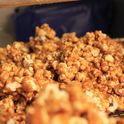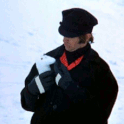why do the french insist on using a wooden spoon when making creme anglaise and not a whisk?
sauce
13 Comments
boulangereMarch 13, 2013
I use either a flat-bottomed wooden spatula or one of silicone or rubber. As spiffypaws points out, any of them makes continuous contact with the bottom of the pot, whatever stirring motion you choose to use. I cook crème anglaise in a bain marie to 165 degrees.
spiffypawsMarch 13, 2013
Personally, I think a silicone spoonula is even better because it scrapes the bottom of the pan more evenly, and you can check for nappe on the back. I worked for a french chef who insisted on wood; I think it was a habit thing. I converted him to the spoonula, but it took months!
ChefJuneMarch 13, 2013
The whisk generates air and incorporates it into the sauce, whereas the wooden spoon does not. Use a wooden spoon for creme anglais, a whisk for sabayon.
DropletMarch 13, 2013
Isnt't it something about the sound the sauce makes? I personally find that if you listen to it, it "tells" you when the custard is reaching the thickening point and helps you take it off the heat at the right time. Technically a whisk doesn't give a good feel for the resistance of the moving fluid as it changes,which is basically another indicator for the above. And the spatula will create additinal slosh because of the flexibility of the silicone. I'd love to know what Mr McGee said, if somebody recalls.
darksideofthespoonMarch 13, 2013
A whisk will incorporate air. making little air bubbles and a wooden spoon doesn't do that. That is what my first pastry chef always told me, especially when making creme brulee.
brandonMarch 13, 2013
also, i love julia child, but she was wrong about a lot of stuff
Sam1148March 13, 2013
Tradition.
Which is why Julia Child did her books about french cooking--and stayed with the important things instead of the trivial things.
Making it accessible to home cooks and breaking down the BS for home cooks.
Which is why Julia Child did her books about french cooking--and stayed with the important things instead of the trivial things.
Making it accessible to home cooks and breaking down the BS for home cooks.
brandonMarch 13, 2013
no, there is a scientific reason. harold mcgee has talked about it in the past, but i cannot remember what his conclusion was.
lindycindyMarch 13, 2013
A wooden spoon allows the cook to draw their finger through the sauce on the back of the spoon. If the line stays, the sauce is thickened and done.
brandonMarch 13, 2013
no there is a different reason. you can check for nappe on a rubber spatula also, however in a french kitchen you are to use only a wooden spoon. I believe it has something to do with how the eggs cook.
Showing 13 out of 13 Comments
Recommended by Food52
Popular on Food52
Continue After Advertisement






